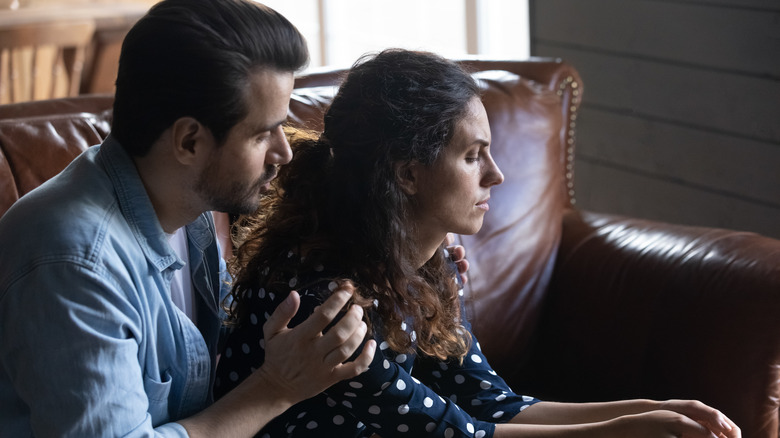Sex Therapist Dr. Kate Balestrieri On How Partners Can Support Each Other While Trying To Conceive - Exclusive
Starting the journey to pregnancy is a really exciting time in a relationship, but it can also be a really stressful time, especially when couples don't get pregnant as quickly or easily as they thought they would.
Though trying to conceive can be stressful for both, the one who intends to carry the baby often experiences more stress than their partner. They're typically the one managing the details like when they're ovulating and when sex needs to happen because it's all dependent on their body, and that can be a lot of pressure.
Sex therapist Dr. Kate Balestrieri often works with couples trying to conceive, and one of the things she helps them figure out is how each partner can support each other through the process. In an exclusive interview with Health Digest, Balestrieri detailed how each partner can take care of the other's physical and mental health while they're trying to get pregnant and how couples can cultivate their relationship during this time.
Share the load
Balestrieri stressed that most of the work of trying to conceive falls on the partner who will carry the baby, and it's important for their partner to find ways to share the physical and emotional load.
"Listen to your partner's needs, experiences and limits, and validate them, even if you don't agree or understand," she said. "If you are not carrying the child, do carry your partner — not literally (although maybe), but in spirit. Be the person they can lean on and feel safe being vulnerable with... Be a part of what replenishes your partner and watch your relationship strengthen for a stronger foundation for your child and as partners and co-parents."
Balestrieri suggested that the partner who will not carry their child spend time researching conception and pregnancy so they can understand the processes and empathize with all their partner is doing. She added that appreciation of how much the carrying partner is doing to make their family happen is crucial during this time.
Learning to co-regulate and create intimacy
Taking care of each other's mental health while trying to conceive is also essential, Balestrieri said. She warned that couples often find themselves arguing more while trying to get pregnant. Many also find they're more easily triggered and their communications skills aren't as good as they were before they started trying to conceive.
"You may both be surprised on a regular basis about how you feel, how something is impacting you and how you're communicating," Balestrieri said. "Expect to be triggered, and practice how to self-regulate and co-regulate. Doing these things allows you to cultivate and reinforce safety, which allows you both to feel more connected and supported and allows your partner to have a more regulated mind and body, which is better for conception."
Balestrieri suggests that all her patients carve out special time for intimacy that has nothing to do with getting pregnant. Take each other on dates, plan something fun for just the two of you, or even have sex without the intention of creating a baby.
"Try to create intentional moments of pleasure that remind you that you are there with each other, not just to create a human," Balestrieri suggested.
Dr. Kate Balestrieri and her team are dedicated to helping people have a more expansive and integrated relationship with sex in an ever-changing contemporary landscape. Learn how Dr. Balestrieri is changing the conversation around mental health, relational, and sexual health and wellness by visiting her website – Modern Intimacy.



